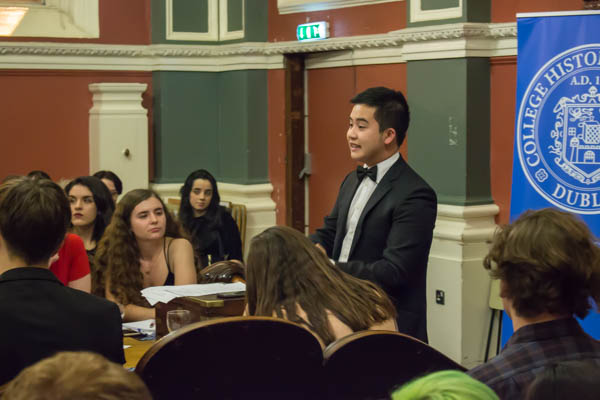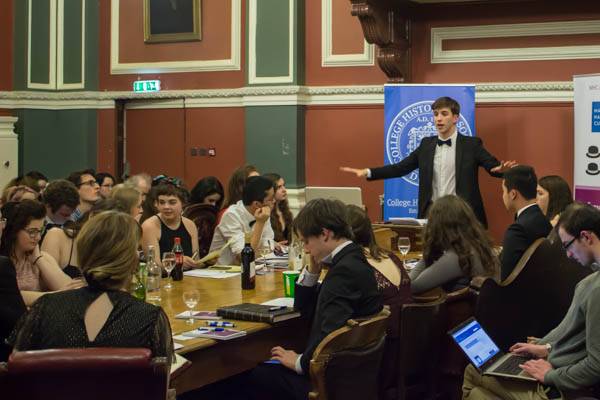The College Historical Society (the Hist) Maidens Final saw the top eight speakers from the past eight weeks compete for victory in the competition, and more importantly, an internship with Mason, Hayes and Curran.
Organised by Record Secretary and last year’s winner, Catherine Kelly, the competition was judged by Stephen James Barr, Catherine Prasifka, Kayleigh Newcombe, former winner Ruth Lennon and Catherine West from Mason, Hayes and Curran. The debate was chaired by lecturer Patrick Geoghegan.
First-year law student Kate Maher won after a very good debate on whether or not we should reject the notion that forgiveness is a virtue.
Lucie McKnight, the night’s runner up, opened the debate by arguing that feeling obligated to forgive can stand in the way of personal growth and that it puts the burden on the forgiver. Saying “forgiveness is neither virtuous or sinful”, where people strive to be the former, they will forgive even if they don’t want to.
She explained how not forgiving can lead to more social and political change where people “harness that anger into action”. McKnight added that “the most celebrated art in society rarely comes from a place of bliss”. She concluded by saying that forgiveness, if seen as not a virtue, would see people being “called out for their bad behaviour”.
Amelia Melanson, the opening opposition speaker, began by challenging us to look at the most extreme examples of forgiveness: the Rwandan Genocide against the Tutsi, who learned to forgive. She said in the proposition’s world there would be no relationships forged from forgiveness, people would only be seen for their crimes and that they would become subhuman. She added that “to face the person who harmed you is brave” and that “forgiveness requires bravery, faith and selflessness”.
Maher, continuing the case for the proposition, refuted many of the arguments brought by the opening opposition speaker, saying “opp think they can transcend victimhood through forgiveness” and they had been “entirely too sentimental”. She argued that “we should reject forgiveness as the universal prescription”. Kate said that “being angry is a form of self-respect – it’s knowing your worth”.
“We’re often encouraged to forgive out of a misplaced desire to be morally superior”, she said, adding “sometimes if you’re not angry you’re not paying attention and I’d rather be the angry feminist bitch than some doe-eyed model of passivity”.

Speakers debated whether forgiveness is a virtue.
She explained that being pressured into forgiving often leads to people being unable to leave abusive relationships as they find it difficult to see their self-worth where their abuser apologises, expecting them to forgive.
Nam Nghiem then got up to tell us that “where forgiveness is no longer a virtue people won’t feel the need to forgive” as there is no societal reward. He said that while not every individual case is perfect, it’s better for society as a whole. Nghiem argued that “not forgiving a person makes someone less able to reconcile with society” and “anger achieves nothing when you want to be on a moral high ground”.
Alexander Soo opened his speech by pointing out that to “forgive someone not because they deserve forgiveness, but because you deserve peace” is a quote he’s heard before. He said he wanted to re-characterise who is affected by the notion of forgiveness as a virtue. When people feel obligated to forgive, they internalise their feelings and that “it’s important to give victims the moral high ground”. He said that when you’re forced to forgive “you don’t know how you feel. You’re in limbo”. This leads, he said, to moral outrage. He argued that genuine forgiveness is better than the opposition’s phony forgiveness, adding that “the point at which you choose you forgive, you remove this moral outrage”.
Oisin Herbots began by arguing “if you don’t forgive, you don’t complete that last step of reconciliation”. Herbots said we should look to some universal truths, using his favourite film The Hangover as an analogy for why, among other things, that ultimately being able to work together to achieve greater things is so important, something we can’t do without forgiveness. He said where forgiveness isn’t seen as a virtue it could be misconstrued as a weakness.
Closing the proposition case, Sophie Furlong-Tighe, the second runner up, argued why this virtuous concept often disproportionately affects women. Though she broadly agreed with what opposition brought, she said that “society loves a forgiving woman” and that “where forgiving is seen as something good people do, when you add gender, it becomes something good women do”. Cultural power, she said, plays a huge role in this, noting the recent open letter signed by 36 women forgiving US Senator Al Franken for sexual misconduct without any mention of the victim. Furlong-Tighe said this was principally wrong.
Laura Crean closed the debate saying “to forgive requires a great deal of courage” but it “doesn’t mean forgetting” and it “doesn’t mean letting that person hurt you again”. She said that “often the people we treat mostly harshly are ourselves and we need to learn to forgive ourselves”.







